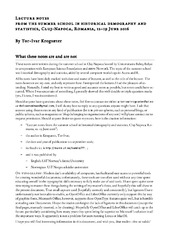| dc.contributor.author | Andresen, Ørnulf Wikstrand | |
| dc.date.accessioned | 2020-09-08T07:53:37Z | |
| dc.date.available | 2020-09-08T07:53:37Z | |
| dc.date.issued | 2020-10-15 | |
| dc.description.abstract | Tema for avhandlingen er å belyse hvordan den tyske okkupasjonsmakten og Nasjonal Samling (NS) innførte nyordning og fører- og ansvarsprinsippet i offentlig forvaltning fra januar 1941. Regimeskiftet var et brudd på politisk og administrativt nivå både for fylkes- og kommuneforvaltningen og den norske staten som skulle omformes i nasjonalsosialistisk retning. Dette fikk konsekvenser for kommunal og fylkesforvaltningen i Hamar, Fredrikstad og Tromsø med respektive fylker, Østfold, Hedmark og Troms. (Landet for øvrig). Jeg har undersøkt hvilken betydning nazifiseringsfremstøtene til Reichskommissar Josef Terboven, NS og Innenriksdepartementets fikk for gjennomføringen av styringsstrukturen for disse kommunene og fylkene. Det omfattet nye NS-institusjoner, personsammensetninger der NS-fylkesfører og fylkesmann skulle lede fylkene henholdsvis politisk og administrativt. NS- oppnevnt ordfører var den suverene fører av kommunen. Felles for disse stillingene var at de skulle styre institusjonene etter fører- og ansvarsprinsippet, de var nærmest eneveldige men sto til personlig ansvar overfor overordnede myndigheter. Jeg har gransket hvilken betydning arbeidsdelingen, saksbehandlingen, reaksjoner og interne endringer fikk for politisk og administrativt arbeide i kommune- og fylkesforvaltningen. Det er også foretatt komparative analyser av forvaltningen mellom de tre byene og fylkene for å få frem om det var ulike eller like reaksjonsmønstre på nazifiseringstiltakene fra okkupasjonsmakten, Nasjonal Samling og Innenriksdepartementet. | en_US |
| dc.description.doctoraltype | dr.philos. | en_US |
| dc.description.popularabstract | This dissertation aims to demonstrate how German occupation powers and the Norwegian party Nasjonal Samling (NS) implemented the `New Order ‘ and principles of leadership and accountability in public administration from January 1941 onwards. The regime change ushered in a political and administrative transformation of county and municipal governance and the Norwegian state in accordance with National Socialist models. This had consequences for municipal and county governance in Hamar, Fredrikstad and Tromsø and their respective counties of Østfold, Hedmark and Troms (as well as the rest of the country). I have examined how the Nazification efforts of High Commissioner Josef Terboven, the NS party and the Interior Ministry affected the implementation of governmental structures in these municipalities and counties. Restructuring entailed the creation of new NS institutions and a new chain of command in which NS-appointed county leaders (fylkesførere) and county governors (fylkesmenn) should oversee their counties in a political and administrative capacity, respectively. On a local level, NS-appointed mayors (ordførere) became sovereign leaders within their municipalities. These offices adhered to a common principle for leadership and accountability in which officials commanded near absolute authority within the scope of their mandate yet remained personally accountable to their superiors. I have studied how the delegation of labour, procedures, reactions and internal reforms affected political and administrative activities in communal and county governance. Through comparative analysis of administration in the three cities and counties, this study also seeks to uncover divergent or similar patterns of reaction to the Nazification measures of German occupation powers, the NS regime and the Interior Ministry. | en_US |
| dc.identifier.uri | https://hdl.handle.net/10037/19240 | |
| dc.language.iso | nob | en_US |
| dc.publisher | UiT Norges arktiske universitet | en_US |
| dc.publisher | UiT The Arctic University of Norway | en_US |
| dc.rights.accessRights | openAccess | en_US |
| dc.rights.holder | Copyright 2020 The Author(s) | |
| dc.rights.uri | https://creativecommons.org/licenses/by-nc-sa/4.0 | en_US |
| dc.rights | Attribution-NonCommercial-ShareAlike 4.0 International (CC BY-NC-SA 4.0) | en_US |
| dc.subject | VDP::Humanities: 000::History: 070::Social history: 072 | en_US |
| dc.subject | VDP::Humaniora: 000::Historie: 070 | en_US |
| dc.subject | VDP::Humanities: 000::History: 070::Political history: 071 | en_US |
| dc.subject | VDP::Humaniora: 000::Historie: 070::Politisk historie: 071 | en_US |
| dc.title | Lyktes Nasjonal Samlings kommuneprosjekt?
Nasjonal Samling, tysk okkupasjonsmakt og norske nazifiserte institusjoners nyordning av kommunal forvaltning i Hamar, Fredrikstad og Tromsø 1940 – 1945 | en_US |
| dc.type | Doctoral thesis | en_US |
| dc.type | Doktorgradsavhandling | en_US |


 English
English norsk
norsk



